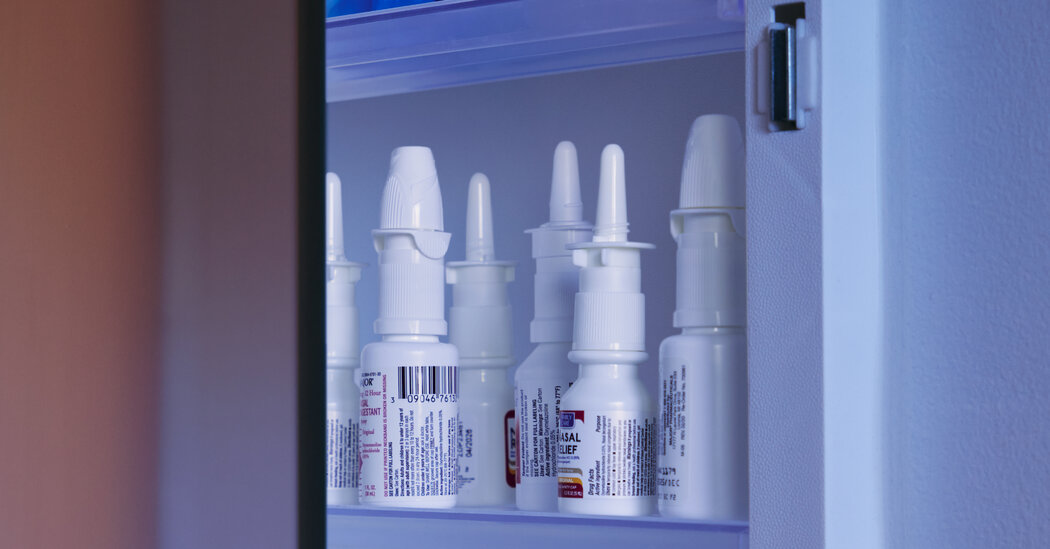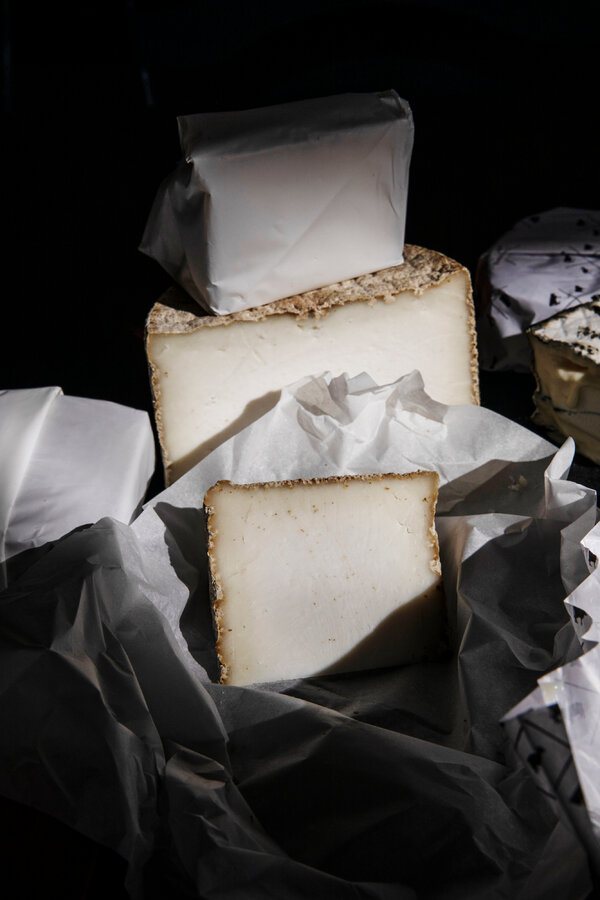Q: Nasal sprays help with my seasonal allergies, but I’ve heard they can be addictive. Is that true? And what should I do if I think I’m hooked?
It’s an issue that has been joked about on social media and on comedy shows like “Saturday Night Live” and “Family Guy”: Once you start using certain nasal sprays, it’s challenging to stop.
Some active ingredients can indeed create extra stuffiness, causing “the compulsion to use it again and again for relief,” said Dr. Edward McCoul, an ear, nose and throat doctor at Ochsner Health in New Orleans.
Dr. McCoul said that an estimated 9 percent of people visiting E.N.T. physicians have what is called rhinitis medicamentosa, or “rebound congestion” — meaning that their sinuses become even stuffier than they were before using the sprays.
The resulting repeated need for nasal spray isn’t technically considered an addiction, said Dr. Jonathan Bernstein, an allergist and immunologist in Cincinnati. The spray would need to change a person’s brain chemistry to fit the official definition.
But the physical dependence is a real phenomenon. When the blood vessels in your nose get too accustomed to certain sprays, you can wind up feeling as though you couldn’t breathe without them.
“It’s such a slippery slope,” said Dr. Lily Pien, an allergist and immunologist at the Cleveland Clinic.
For this reason, experts say, you should read the instructions on all sprays closely. Most habit-forming sprays have a recommended limit of two sprays per day for up to three days. Any more, and you run the risk of rebound congestion.
Which sprays are habit-forming?
The sprays to watch out for are the ones categorized as nasal decongestants, which contain active ingredients like oxymetazoline (Afrin, Sinex) and phenylephrine (Neo-Synephrine), Dr. McCoul said.
Decongestant sprays temporarily restrict the blood flow in your nasal passages, shrinking your blood vessels so the air has more room to circulate. If your blood vessels get too accustomed to these drugs, they can swell up as soon as you stop using them, making for even narrower airways.
Because of that, decongestant sprays are best for short-term use, Dr. McCoul said. “The common cold is the ideal situation for nasal decongestant sprays,” he said. “After a few days, the cold is naturally going to get better, so you’ll no longer need the spray.”
For allergies and chronic congestion, the experts all suggested steering clear of habit-forming kinds of decongestants.
Which sprays are not habit-forming?
If you’re stuffed up for more than three consecutive days — say, during a bad allergy season — experts have good news: Not all nasal sprays carry the risk of rebound congestion.
Steroid sprays. Sprays that contain steroids like mometasone (Nasonex) or fluticasone (Flonase) are safer alternatives for treating long-lasting congestion, Dr. Pien said, because they won’t cause rebound congestion.
As with decongestants, steroid sprays reduce nasal inflammation, Dr. McCoul said, but they won’t work as quickly. “Don’t get discouraged if you don’t get an immediate effect,” he said. Steroid sprays can sometimes take up to a month of once-daily use to work.
Antihistamine sprays. Sprays that contain the antihistamine azelastine (Astepro) are also safe to use and do not create dependence, Dr. Pien said. They block the histamine receptors in your nose linked to itching, sneezing and watery eyes.
Antihistamine sprays usually clear allergy symptoms more quickly than steroid sprays, Dr. McCoul said. But if your nose is more stuffy than runny, steroid sprays might be best, since they’re better at directly reducing inflammation. Combining steroid and antihistamine sprays is also a safe option, Dr. McCoul said, and both may work better than either type on its own.
You can use steroid and antihistamine sprays for as long as you need without risking rebound congestion, said Dr. Richard Lockey, an allergist and immunologist at the University of South Florida.
“These are extraordinarily safe medications,” he said. “Some people use them indefinitely all their lives.”
Saline sprays. Sprays that contain saline (usually made from just salt and water) are safe and medication-free, Dr. McCoul said. They can reduce dryness and help clear nasal passages of particles or germs that cause inflammation.
If you prefer a conservative approach, Dr. McCoul recommended trying saline spray before anything else.
But if congestion is an everyday problem, it’s a good idea to see an allergist, Dr. Lockey said. And you should always ask your doctor before using any over-the-counter medications, Dr. Bernstein said.
I think I’m hooked. What should I do?
If you have been using decongestant sprays for more than three days and feel as if you can’t stop, the experts agreed it’s time to get medical help.
Using these sprays for too long can damage your septum, the cartilage that divides your nostrils, Dr. Bernstein said.
Start by visiting a primary care doctor, Dr. Pien said. Depending on your situation, you might be referred to an allergist or an E.N.T. physician.
From there, doctors might prescribe an oral steroid, which can help reduce swelling as you wean off decongestant sprays. Some also suggest alternating decongestant sprays with steroid sprays as you gradually reduce your dependence on the decongestants.







